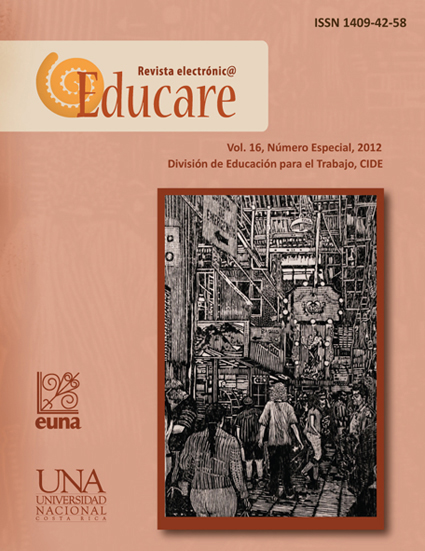Masculinity and Femininity: What are we Talking About?
DOI:
https://doi.org/10.15359/ree.16-Esp.1Keywords:
Masculinity, femininity, patriarchy, gender, human rights and gender equality.Abstract
By presenting some of the ideas constructed on masculinity and femininity, this paper aims at clarifying such concepts, in plain language, from a critical –and gender-sensitive– point of view, and make such information available to a wider public, without undermining, however, the importance of conveying ideas in academic and scientific terms, as well. Therefore, its purpose is to clarify the nature of both concepts in the construction of the individual’s identity, particularly in the case of men whose identity is based on the rejection of femininity. This paper explains how such constructions are permeated by social mandates, which manifestation will depend on the culture. It also alerts us on the challenge of education in deconstructing gender-based stereotypes.
References
Camacho, S. (2005). Masculinidad, ¿el nuevo concepto? Enkidu. Recuperado de http://www.
enkidumagazine.com/art/2005/280705/E_031_280705.htm
Connell, R. (2003). Masculinidades. México, DF.: Universidad Autónoma de México.
Facio, A. (2009). La igualdad substantiva. Un paradigma emergente de la ciencia jurídica.
Recuperado de http://www.cidem-ac.org/PDFs/bibliovirtual/IGUALDAD/IGUALDAD%20
SUSTANTIVA.%20DRA.%20ALDA%20FACIO.pdf
Hernández, Y. (2006). Acerca del género como categoría analítica. Nómadas. Revista crítica
de ciencias sociales y jurídicas, 13(1), 111-120. Recuperado de http://www.ucm.es/info/
nomadas/13/yhgarcia.pdf
Instituto Nacional de las Mujeres (INAMU). (2003). Módulo educativo psicología-secundaria:
Aplicación de la visión de género a los programas de estudio del MEP. San José, Costa Rica:
INAMU, MEP.
Lagarde, M. (1997). Identidad genérica y feminismo. Heredia, Costa Rica: Instituto de Estudios de
la Mujer, Universidad Nacional.
López, A. y Güida, C. (2002). Aportes de los estudios de género en la conceptualización sobre
masculinidad. Recuperado de www.inau.gub.uy/biblioteca/sexu4.doc
Otegui, R. (1999). La construcción social de las masculinidades. Política y sociedad, 32,
-160. Recuperado de http://revistas.ucm.es/index.php/POSO/article/view/
POSO9999330151A/24698
Seidler, V. (2002). Transformando masculinidades: El trabajo, la familia, y la cultura. En EMAKUNDE
(Ed.), Congreso Internacional los hombres ante el nuevo orden social (pp. 19-28). Vitoria-Gasteiz, España: EMAKUNDE. Recuperado de http://www.emakunde.euskadi.net/u72-publicac/es/
contenidos/informacion/pub_jornadas/es_emakunde/adjuntos/congreso2002_%20es.pdf
Subirats, M. (septiembre-diciembre, 1994). Conquistar la igualdad: La coeducación hoy. Revista
Iberoamericana de Educación, 6, 49-78.
Valenzuela, P. (3 de agosto de 2007). Masculinidad y relaciones de poder entre los hombres [Mensaje
en un blog]. Recuperado de http://logos.psykhe.org/2007/08/masculinidad-y-relacionesde-poder.html
Downloads
Published
How to Cite
Issue
Section
License
1. In case the submitted paper is accepted for publication, the author(s) FREELY, COSTLESS, EXCLUSIVELY AND FOR AN INDEFINITE TERM transfer copyrights and patrimonial rights to Universidad Nacional (UNA, Costa Rica). For more details check the Originality Statement and Copyright Transfer Agreement
2. REUTILIZATION RIGHTS: UNA authorizes authors to use, for any purpose (among them selfarchiving or autoarchiving) and to publish in the Internet in any electronic site, the paper´'s final version, both approved and published (post print), as long as it is done with a non commercial purpose, does not generate derivates without previous consentment and recognizes both publisher's name and authorship.
3. The submission and possible publication of the paper in the Educare Electronic Journal is ruled by the Journal’s editorial policies, the institutional rules of Universidad Nacional and the laws of the Republic of Costa Rica. Additionally, any possible difference of opinion or future dispute shall be settled in accordance with the mechanisms of Alternative Dispute Resolution and the Costa Rican Jurisdiction.
4. In all cases, it is understood that the opinions issued are those of the authors and do not necessarily reflect the position and opinion of Educare, CIDE or Universidad Nacional, Costa Rica. It is also understood that, in the exercise of academic freedom, the authors have carried out a rogorous scientific-academic process of research, reflection and argumentation thar lays within the thematic scope of interest of the Journal.
5. The papers published by Educare Electronic Journal use a Creative Commons License:














 The articles published by Educare Electronic Journal can be shared with a Creative Commons License:
The articles published by Educare Electronic Journal can be shared with a Creative Commons License: 



